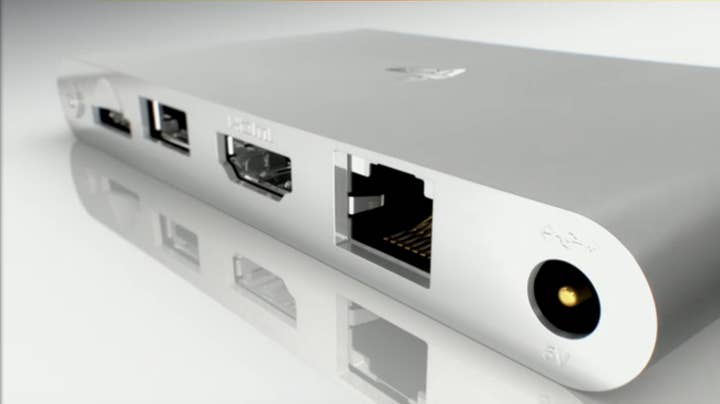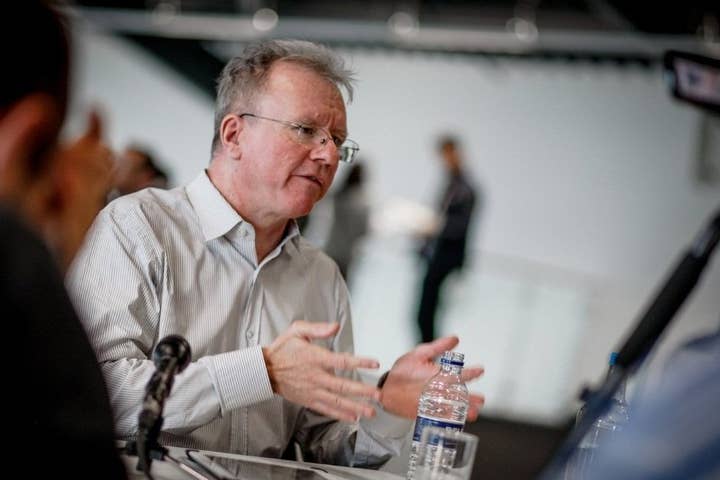Sony: PS4 success is "important for the shape of the whole industry"
Jim Ryan explains how strong sales make innovation easier, and clarifies SCE's position on EA Access
Microsoft may have realigned its messaging around the Xbox One after a very unsteady start, but Gamescom proved that Sony isn't about to give up its early lead through simple mistakes. With a broad range of games on show and some tantalising new technologies and services in development, Sony further strengthened its position as the pre-eminent console at this stage in the generation.
But while SCE Europe president Jim Ryan departed the Gamescom stage with the reassurance that the PlayStation 4's success will not lead to complacency, he also knows that some things are far easier to say than they are to realise. In this interview, Ryan discusses the importance of variety to the new generation of consoles, and finding the line between freedom of choice and quality of experience.
It's so much faster than we've ever done it before. We're pretty pleased with it.
Having momentum and having that initial success - and it is just initial, there's a long way to go yet - it puts us in good heart for the future. Some of the stuff we touched on yesterday, talking about the future, whether that's PlayStation Now, whether that's Morpheus, PlayStation TV in the nearer term - all of these things require investment.
It's much easier to make decisions like that from a position of relative success, relative strength, rather than a world where PlayStation 4 was struggling, where our momentum wasn't great. The money man would be thinking, 'hmmm, do we really want to put more into this?' Those conversations, which are very important for us and very important for the shape of the whole industry, they become easier. That can only be a good thing.
"All that [Xbox vs. PS4] feeding frenzy last year was interesting, but I think, and I hope, that it has run its course now"
Yeah, we made so many mistakes last time round that I won't list them now. But we did list them, and we vowed to rectify them. By and large, I think we've done that.
In some ways, all that feeding frenzy last year was interesting - probably great for you guys - but I think, and I hope, that it has run its course now. We're just getting on with doing our thing. We haven't really changed course at all. We've got plans, and we're confident about them. Some of that was laid out last night, other stuff will follow in due course. We'll just get on with it.
I think that's right. Some of that comes from the polarisation of the industry. Everybody can see that the big studios getting bigger and more monolithic, and there's this really interesting emerging sector at the entry level - I dread to use the word "indie" these days. That brings breadth and variety.
And then on the time axis, what you saw a bit of last night was the first signs of us starting to think about different audiences. Some of the games last night were 2015, possibly even beyond, where we're going to be looking at something a little bit broader, a little more mass. Those two things meant you had a range of types of developer activity, but also looking at slightly different audience profiles. You've got Bloodborne at one end of it, Tearaway at the other.

That's accurate, because we've done the comparison and there are way more this time. Maybe it was a bit patchy over the summer. I kind of get...frustrated is perhaps too strong a word, but you hear, 'Where are the games for PlayStation 4?' and there are more than there have ever been at this stage on any new console platform. But I think 2015 is going to be great from that perspective. Starting with Destiny, it'll really begin to take off.
Yeah, we think it's really, really important. I'm glad you picked up on that, because it's something I was really hoping we conveyed. I think we did well at showing a variety of games, but we also wanted to drive home these ways we're trying to innovate. There's a whole different set of areas we're looking at: virtual reality, streaming, remote play, this share play idea, which is actually a very cool feature. It's hard to articulate some of that on the stage.
"We've always said that PlayStation 4 would be a socially connected console, but that's dead easy to say and talk is cheap"
The risk is that you talk about this stuff and then you don't deliver, and we run that risk by putting this innovation story out there. But we reflect very carefully, internally, before we stand on the stage and talk about these things.
We've been pretty careful to position Morpheus as an R&D thing for now. Everybody who tries it seems to love it, and some of our devs are getting really amped up about it. With PlayStation Now, the end state is hugely seductive: PlayStation games streamed to PlayStation devices, other Sony devices, and then hopefully not too far behind that other, non-Sony devices. It's very intriguing, very seductive, and very difficult.
The message to get across in a meeting like this is, 'It ain't gonna happen tomorrow.' This is a multi-year horizon, but if we do it, to have that universe of potential client devices, virtually all of which can be accessed with no barrier to entry of the need to purchase a console, as a future end-state it is hugely exciting.
Yeah. And, y'know, those conversations did take place. It kinda goes back to learning the lessons from last time round. We've always said that PlayStation 4 would be a socially connected console, but that's dead easy to say and talk is cheap.
If you want to position it that way you've got to deliver in terms of the feature set. And at a very high level, taking that approach and being true to the promise - which we haven't always done - that must prevail over cannibalisation of sales. Ultimately, that is a narrow tactical consideration.
We see two user cases. We see the remote play user case as being potentially quite powerful. For under £100 you can have a PlayStation experience, output it through a television elsewhere in your house. Look at the models where you can get Sky elsewhere in your house and it starts to look like a pretty good deal. So you have that, and it's also just an affordable console. It's not an inconsiderable amount of money, but it's cheap.
I can see that. The person with a PS4 and a Vita is likely to have two televisions as well.

It's a fair question, and it's one that we all need to reflect upon, and not just carry on doing what we've done in the past. It is one of the points of differentiation between our platform and any other. We have this big network of studios making experiences that are on our consoles and nowhere else, and that remains a definite plus.
"We try not to be dogmatic about anything, but it's important to be measured in your approach to this sort of thing [EA Access]"
Yes, I do think there's a risk of overcooking these things and making them too complicated. There are limits to peoples' attention spans. It does need to be simple.
We've got to look at this issue very holistically, to look at the consequences of that service relative to existing services on our platform, relative to other services that might come along from other companies. We have to juggle a lot of balls. I don't think we're ruling anything in or out forever, but right now we don't think it's right for the platform.
It's a sensitive area, but that's the sort of thing that we're thinking about.
We try not to be dogmatic about anything, but it's important to be measured in your approach to this sort of thing, because there are ripple effects. Precedents do get set, and if you're not careful you can end up in a place that isn't good for the platform. And more importantly, isn't good for the people who've bought into the PlayStation proposition.
We saw all the reaction, and it's understandable, but I don't think people should get too hung up on it at this stage.

